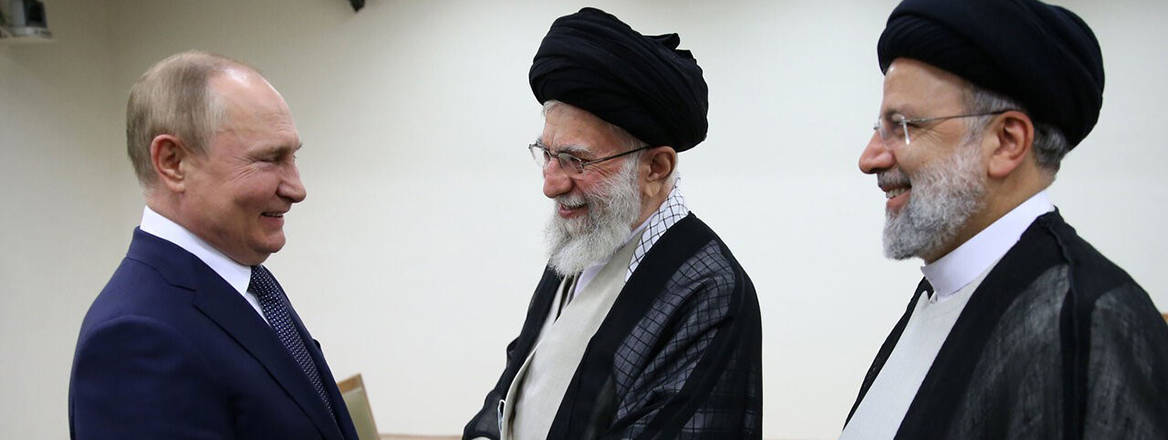Friends with Benefits: Iran and Russia after the Ukraine Invasion
Despite speculation around Russian President Vladimir Putin’s recent trip to Tehran, Russia–Iran relations remain firmly transactional.
President Vladimir Putin’s recent visit to Tehran, coupled with intelligence released by the US about Iran’s provision of armed drones to Russia, has renewed speculation that the relationship between the two might finally be moving towards a deeper, more strategic one. While these developments deserve careful monitoring, nothing much has changed in their ties yet. They continue to opt for ad hoc cooperation on specific issues and crises, which is balanced by mutual mistrust and competition, even in the context of the Ukraine war and its global implications.
Soon after being elected, the new Iranian president, Ebrahim Raisi, claimed one of his priorities would be to cement ties with Russia. Putin echoed Raisi’s sentiment, expressing the hope that relations between the two countries would keep progressing towards constructive cooperation under the mandate of the new Iranian administration. In his first official bilateral foreign visit, in January 2022, Raisi travelled to Moscow, signalling the importance he placed on the country. There he claimed that ties between the two were on the path of strategic relations, and handed over to his counterpart the draft of a 20-year cooperation agreement – a new version of an existing deal dating back to 2001 and updated three times since.
Only few weeks later, however, significant tensions emerged between the two capitals. Following the Russian invasion of Ukraine and the introduction of heavy sanctions against Moscow, Russia demanded written guarantees from Washington that sanctions would not affect the country’s economic ties with Iran. This request nearly torpedoed talks over the Iran nuclear deal (also known as the Joint Comprehensive Plan of Action, or JCPOA) and halted the progress the parties had made towards a deal after a year of negotiations.
Russia’s move led to significant criticism from within Iran, especially from the moderate conservative camp. The outlet Jomhuri-ye Eslami, for instance, criticised Russia for complicating efforts to revive the JCPOA, claiming Russia ‘did not have the right either to jeopardise the JCPOA or to saddle Iran with problems’ in the pursuit of its own interests. It also criticised Russia for turning a blind eye to Israeli strikes on Iranian positions in Syria, which, on 7 March, killed two senior members of the Iranian Revolutionary Guards. A reformist outlet, Shargh, even argued that Iran should rethink its bilateral relationship with Russia. It argued: ‘It is clear that Russia, which we view as a strategic partner, does not see us as a strategic partner at all, us[ing] Iran as a playing card at the negotiating table in Vienna to extract concessions in the Ukraine embroglio’.
The prevailing sense, in both countries, remains one of mutual mistrust and of a transactional relationship only. The latest meeting in Tehran, for instance, was intended mainly to send a signal to the West that neither country is isolated or submitting to US pressure. The timing was not a coincidence, since it took place right after US President Joe Biden’s trip to the Middle East in an attempt to shape a regional alliance against Iran, while also trying to secure a commitment from Saudi Arabia to increase its oil outputs in order to mitigate the impact on global supplies of Russia’s war in Ukraine.
Despite all the fanfare, for now all signs point towards the continuation of the ‘friends with benefits’ relationship between Russia and Iran
The visit was also motivated by the need to discuss the future of Syria, which remains the biggest shared priority between Moscow and Tehran, and one on which the two countries have been cooperating for nearly a decade. In Tehran, they both refused to back Turkish President Recep Tayyip Erdogan’s demands for support for a Turkish offensive into the northwest of the country. They also committed to work closely to end the US presence on the Euphrates.
Other than that, Putin’s trip to Tehran did not result in any additional advances in bilateral relations. Putin managed to gain the backing of the Supreme Leader for the Ukraine invasion. Ayatollah Ali Khamenei openly supported Russia for the first time, saying ‘if you had not taken the initiative, the opposite side would have caused (the outbreak) of war’. However, whether this will mean anything concretely – such as the delivery of armed drones to Moscow – remains to be seen. Iran has so far claimed that its military cooperation with Russia ‘on new technology predates the Ukraine war and has not had a significant change in recent times’.
Even the much-publicised deal between Gazprom and the National Iranian Oil Company seems to be hot air at this stage. The memorandum of understanding is not the first of its kind and, as in the past, is unlikely to translate into anything concrete given both countries are under sanctions (thus facing significant challenges when it comes to investments) and are energy competitors, as they scramble to find buyers for their sanctioned oil.
Despite all the fanfare, therefore, for now all signs point towards the continuation of the ‘friends with benefits’ relationship between Russia and Iran, based on coordination on specific issues of shared interest but without deeper, longer-term strategic cooperation.
The views expressed in this Commentary are the author’s, and do not represent those of RUSI or any other institution.
Have an idea for a Commentary you’d like to write for us? Send a short pitch to commentaries@rusi.org and we’ll get back to you if it fits into our research interests. Full guidelines for contributors can be found here.
WRITTEN BY
Dr Aniseh Bassiri Tabrizi
External Author
- Jim McLeanMedia Relations Manager+44 (0)7917 373 069JimMc@rusi.org


